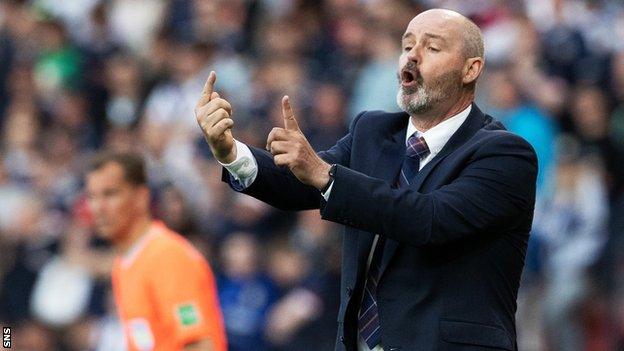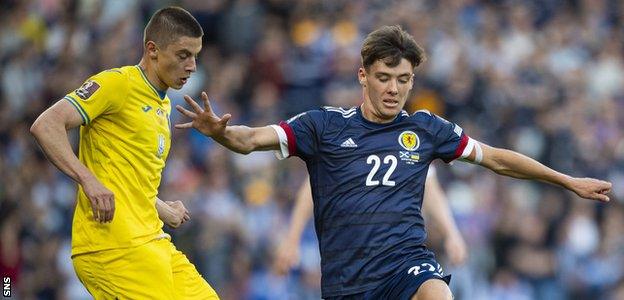Scotland 1-3 Ukraine: Scots toil against magnificently true Ukraine in World Cup play-offs
- Published

Steve Clarke's Scotland sustained their first Scotland defeat in nine games against Ukraine
Steve Clarke's poker face remained intact, his demeanour telling you nothing about how dreadful a night this was for himself and his team.
In keeping his emotions in check, the manager was pretty much alone after Scotland's 3-1 World Cup play-off semi-final defeat by Ukraine. His players couldn't match him in the deadpan stakes. They had regret written all over them. Two games away from a place at the World Cup, so many of them picked the wrong time to lose the plot.
So much of the preamble was given over to how Ukraine would handle things at Hampden. Just fine, as it turned out. They tore through a Scotland midfield that wasn't at the races, they found vast prairies of space in a three-man Scotland defence that was ill-selected and left in situ for far too long, way after it became obvious that it was just not working.
Clarke's selection and formation is being criticised, as is his slowness to change it when it was evident that the thing was being ripped apart, but post mortems won't bring the World Cup dream back to life.
Ukraine are heading for Cardiff to face Wales in Sunday's final, not Scotland. They could be going there on the back of a four or even five-goal winning margin, but in the aftermath at Hampden they didn't look like men who were going to ponder that for very long. They were outstanding in every sense.
'Caped crusaders with faces of steel'
In the beginning, the national flag around their shoulders, the caped crusaders walked out into the Hampden arena. They stood for their anthem and what did we expect from them in this moment - for the tears to come tumbling, for some visual manifestation of the emotion they were feeling in trying to do justice to those fighting back home?
There was actually none of that. It must have been bubbling inside of them, but all that could be seen in the players' faces was steel. Cold, unblinking steel. Their focus was arresting. In the pre-match press conference Oleksandr Zinchenko had wept for his country, but now, in the moment of truth, Zinchenko stared into the distance with an entirely different look in this eye. That was when onlookers suspected Scotland were in trouble. Very soon after, all absolutely knew that they were.
Scotland v Ukraine: Tearful Zinchenko urges Ukraine to reach World Cup
Ukraine went clattering into two early tackles that brought them two bookings. Roman Yaremchuk took out Billy Gilmour in a way that suggested these boys were not in a mood to mess about. Then, Ruslan Malinovskyi went in, studs up, on Lyndon Dykes.
So much for the niceties. So much for the notion that the enormity of the occasion might prove too much for the visitors. So much for six of the team being undercooked because they'd had no competitive games for months. They looked fitter, stronger, mentally sharper, more comfortable on the ball, better in every way. They were terrific.
They seized on Scotland's many frailties, the confusion that reigned in defence and the lack of influence among his go-to names all over the park. Clarke picked Scott McTominay as his right centre-back and Aaron Hickey as his right wing-back. They're both fine players but those are not their natural positions.
Nineteen-year-old Hickey in particular toiled in an unfamiliar position with senior players around him completely unable to get a grip on things. Ukraine didn't just look like they'd done their homework on Scotland, they looked like they'd done a doctorate. In training camp in Slovenia for the past six weeks to two months, their laser-like focus on the Scots was evident.

Aaron Hickey (right) struggled in an unfamiliar position
The busiest man was Craig Gordon. The one upside is that most of this Scotland squad will have another crack at qualifying for a World Cup down the line. The age profile is still decent and the team should get better with time. Time is not on Gordon's side, though. He's 39 now and that was it, the last shot at reaching the biggest stage.
What a game he had. Again. Viktor Tsygankov had a chance that Gordon tipped over the bar. Andriy Yarmolenko had a chance that Gordon somehow kept out. Seventeen minutes had been played and the Tartan Army would have been looking at each other with that old fatalistic expression on their face. A stadium that been raucous had become hushed, the noise coming from the ranks of Ukrainians in the left corner of the lower south stand.
It took Ukraine 33 minutes to open the scoring - long ball, defenders napping, a forlorn plea for offside from Andy Robertson, a beautiful finish by Yarmolenko - but they'd figured out Scotland long before that. They were sharp where the Scots were sluggish, their speed of thought was rapid where the Scots were ponderous. There was nothing coming from John McGinn, so often the totem now reduced to the status of relative bystander. There was nothing coming from Gilmour, who was impossibly quiet before his withdrawal. There was nothing from Robertson, Dykes, Adams and the rest.
They might have told themselves beforehand that the aim was to leave the pitch at the end with no regrets. They'll have a world of them. Ukraine were excellent, it's true. Maybe a strong performance from Scotland still wouldn't have been enough to beat them. This was a display that was beneath them.
Questions to answer for Clarke
Clarke changed it at 1-0 by bringing on Ryan Christie at half-time, but the big change - going to four at the back and getting McTominay into the middle of the park where he's most comfortable - only happened after Ukraine made it 2-0. Their second was Scotland's performance in microcosm. Ball given away, defenders standing off, cross not blocked in the first instance or cleared in the second, simple header from close range. Goal. Hickey and McTominay were both on the scene when Yaremchuk nodded home, but there were many others culpable for what happened.
Stuart Armstrong came on, Scotland rallied, scored and huffed and puffed. There was a lot of energy, but not much of it was convincing, Ukraine's third brought the curtain down. Might it have been different had Kieran Tierney been in there with his defensive composure, attacking nous and presence? One of the unknowns. He was missed, though. Missed very badly.
Clarke was right when reminding people post-match his team has come a long way and their progress should not be forgotten amid the disappointment. But the issue is whether they'd come further than this. Their consistently strong performances over the past while and the excellence of the win against Denmark suggested it.
'Toughest 10 days' of Scotland captain's career
The memory of John Souttar playing so well in that game in the position that McTominay occupied so nervously for too long on Wednesday is instructive. Why did Clarke mess with that? Christie started that game against Denmark, too. He's had a fine season with Bournemouth and played well when he came on against Ukraine. Why did Clarke not just leave him in the team from the beginning based on that stellar Denmark performance? The manager had a lot of time to think ahead of this game. Did he overthink it?
Robertson said the match passed Scotland by, that they didn't turn up. Those are damning comments from a captain about the psychology of a team in such a massive game, a team so praised of late - and the praise has been hard-earned and well-deserved. Apart from their three goals, Ukraine had another nine decent-to-good chances.
This was their night. Their country under siege, their people killed in huge numbers, their population on the move to safer lands by the millions, their soldiers on the front lines shedding blood. Their players had a cause and they were magnificently true to that cause.
They play Wales on Sunday for a place at the World Cup. Scotland await the arrival of Armenia on Wednesday and the start of a new Nations League campaign. Excited?
